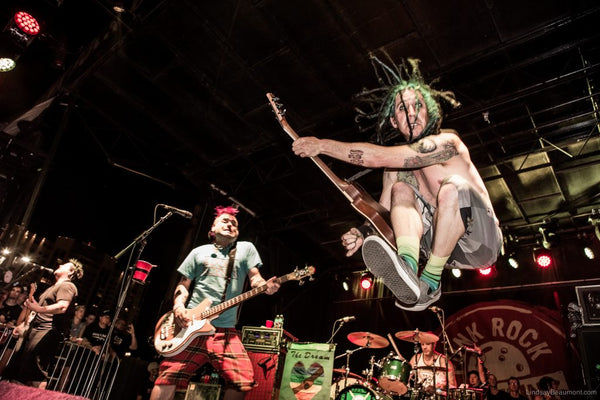
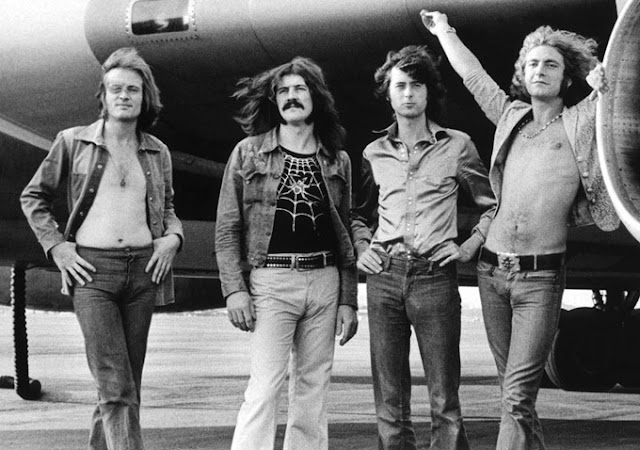
In the mid-1970s, Led Zeppelin was one of the most popular and influential bands in the world. Following Elvis, they are the second-highest best-selling artist in the United States. Noted for their roots in blues, jazz, and folk music, in addition to rock ‘n’ roll, their songs often ran in excess of six minutes, a significant duration when vinyl records were limited to 22 minutes per side. In 1975, Led Zeppelin released Physical Graffiti, on which the average song length is over five and a half minutes, and the longest track clocks in at eleven minutes, four seconds.
Led Zeppelin is a prominent example of the trend in the 1960s and ‘70s of long, extended songs that focus more on theatric instrumentals than a lyrical motive. This trend is also found in Jimi Hendrix’s fifteen-minute long Voodoo Chile, Iron Maiden’s seven-minute Phantom of the Opera, and Iron Butterfly’s seventeen-minute In-A-Gadda-Da-Vida. Punk rock is a deliberate divergence from this trend. When The Ramones, often considered the first punk band, released their debut album in 1976, all fourteen tracks were less than two and a half minutes long. This abrupt shift in style would set the precedent for punk’s nonconformism and blunt efficiency.

The Ramones
Punk rock and hardcore music emerged as an active resistance to the perceived musical, economic, and social excesses of mainstream 1970s music. Musically, punk and hardcore are characterized by short, strident, up-tempo songs performed with consistent, straightforward instrumentation, meaning a lack of synthesizers, guitar effects, or post-production audio modification. Lyrically, punk is laconic and not especially poetic, and focuses on social and political issues, relationships and sexual topics, or on the punk scene itself, though exclusively the social and political facet is germane to the discussions at hand. It is also characterized by a variety of anti-establishment and not-for-profit ideologies. Ian MacKaye, the founder and vocalist for Minor Threat, has described punk as,
“this idea of new ideas being able to be presented in an environment that wasn’t being dictated by a profit motive.”
Hardcore punk is consistently and obstinately anti-establishment and nonconformist, and thus societal norms, to a certain degree, define what punk doesn’t do. This subversion, in turn, sometimes [elicits] a response from the government or whichever establishment was being rebelled against. These parallel reactions have resulted in the formation of several movements within the punk scene. The relationship between hardcore punk and society is represented by several ideologies and movements, including extremist liberal political stances, a do-it-yourself ethic, and the straight edge movement. Each stands for a direct opposition against a contradicting ideology and behavior, although the motives differ.
Liberal Political Stances

Stick To Your Guns
Hardcore punk is often characterized by anti-establishment, liberally charged lyrics, ranging from the advocating of civil rights to communism to anarchy. Stick to Your Guns, a [formerly] straight edge hardcore band from California, often writes songs concerning current events in politics and society, these songs being written with a liberal slant. For example, the politically charged Bringing You Down was inspired by the Occupy Wall Street Movement. Society influenced Stick to Your Guns to write about the drastic income inequality during the great recession, and that discontent was reflected in the lyrics,
“Your job’s been ripped from you and on deck, your home/ Can’t feed yourself, let alone feed the kids/ American dreams have turned to your American greed.”
In addition to the economic status of America, Stick to Your Guns was also interested in human rights, specifically gay rights. Life In A Box exemplifies the band’s feelings about groups such as the Westboro Baptist Church by supporting acceptance rather than condemning others with hate and suppression.
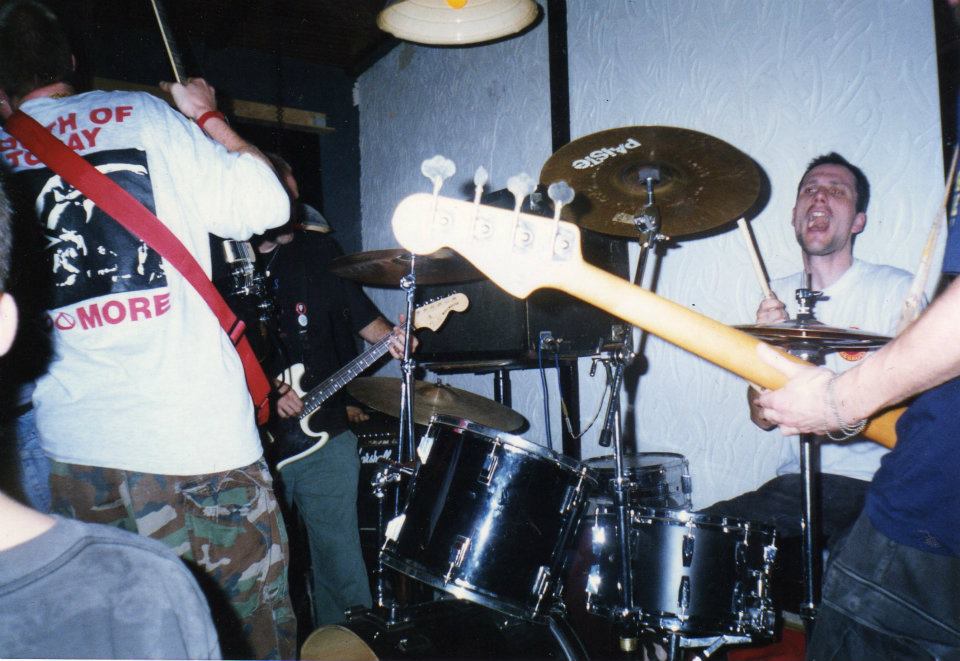
ManLiftingBanner
Despite the unwavering obstinacy in these lyrics, Stick To Your Guns isn’t nearly as radical as other bands. ManLiftingBanner, a Dutch hardcore punk band that supports communism, is much more liberal in their ideologies. They actively speak out against racism and Nazism, even pugnaciously. Their songs are designed “to urge people to literally stand up against racism and to convince them that actions speak louder than words.” In an interview, Olav van der Burg, the drummer, said that there are things that can be solved solely through talking and diplomacy, but that skinheads “are not interested in discussion; they want trouble.” As far as Communism, the band doesn’t condone the American dogma associated with Stalin’s communism, stating, “The system that fell was nothing more than post-feudalism with a socialist sauce.” Rather, their communist beliefs are based on the social goal of true equality and justice for all people, and the willingness to potentially act violently as a means to that end.
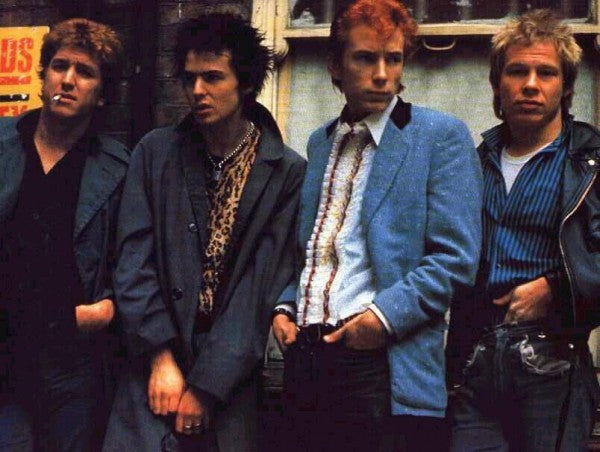
The Sex Pistols
Finally, the anarchic point of view in punk is the zenith of radical politics. Many early punk bands, most notably the Sex Pistols, advocated anarchy, especially through their songs Anarchy in the UK, and God Save the Queen, among others. However, since they sing about anarchy as a general concept rather than a disciplined ideology, they are therefore ostracized from the more sincere anarcho-punk movement represented by artists such as Aus-Rotten, Reagan Youth, and Crass. While both points of view share the same base views and acknowledge the same problem, the former’s rationale is based on idealizing the polar opposite of the problem, while the latter view anarchy as the optimal solution.
And so it can be seen that the fundamental anti-establishment philosophy of the punk subculture is manifested in varying degrees of radical liberal politics. Some liberal bands speak out against hatred and inequality. Other bands with communist sympathies advocate absolute equality on all planes. At the zenith of this philosophy, certain groups profess the deconstruction of all organized authority based on its tendency to further its own interests at the expense of the masses.
The DIY Ethic
Besides liberal political stances, society has also influenced punk to adopt a do-it-yourself ethic. DIY refers to a belief in self-reliance and independence, especially with an anti-consumerist motive. It promotes the idea that people are capable of performing a variety of tasks, including gathering of resources and reparation/maintenance of certain things, rather than relying on paid specialists to replace or fix a problem. Therefore, it necessitates that participants take initiative to seek out the knowledge required to complete a given task. Common forms of the DIY ethic are observed in practices such as home improvement and dumpster diving, as well as in a punk setting with independent record production, design and distribution of merchandise, and holding concerts in residential basements.
Outside of the hardcore punk subculture, dumpster diving could potentially be considered the most anti-establishment DIY practice due its questionable legality and the condescension with which it is viewed by the more privileged populace. In the United States, dumpster diving is legal because law enforcement does not require a warrant to obtain discarded evidence, as long as the dumpster is not behind a fence on private property, due to there being no reasonable expectation of privacy. Therefore, once an item is discarded, it ceases being private property and therefore cannot be stolen.
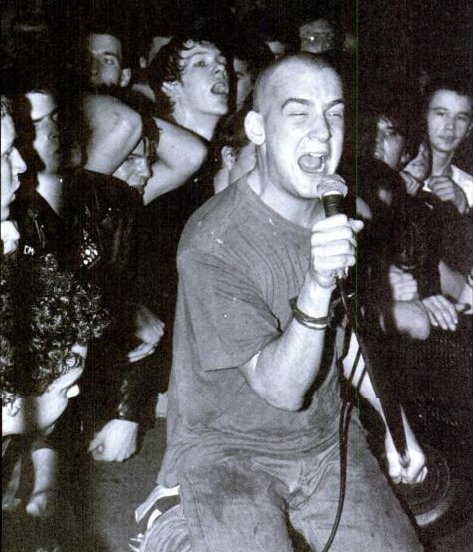
Ian Mackaye of Minor Threat
Within the punk scene, however, the DIY ethic revolves around the self-reliant production, advertisement, and performance of music. Ian MacKaye of Minor Threat has related the band’s first [auto-didactic] record production as consisting of sending a tape and $500 to a friend’s friend for 1000 records, then drawing their own sleeves and making copies at a print shop, and putting them together one by one with scissors and glue. He described the experience as “the true record industry,” and “an amazing experience.” Concerning file sharing and Internet pirating, he said he’d rather know that someone got to enjoy his music than have pecuniary benefits, and that while record companies are attempting to prevent thievery, “It’s just for those of us who don’t want to engage in that to figure out how to get around their silly tollbooths.” Minor Threat was based in Washington DC, and so MacKaye says that [the secret to] operating in an environment where the government has such a strong presence is to never engage them, but rather work around the margins.
Straight Edge
In addition to the do-it-yourself ethic, some hardcore punk fans are straight edge. Straight edge is a movement within the punk subculture where participants refrain from smoking, doing drugs, and drinking alcohol. For some, this ethic extends to vegetarianism, veganism, and abstinence from casual sex. It has been established that punk often rebels against mainstream society, but in the 1970s, many punks did drugs to rebel against authority. However, the straight edge movement is a rejection of that philosophy, instead believing that personal well-being is a higher priority than “sticking it to the man.” In a way, this makes straight edge a counter-counter-culture. Henry Rollins, who was childhood friends with Ian MacKaye and performed in many punk bands in the early ‘80s, is quoted as saying,
“If you hate your parents, the man, or the establishment, don’t show them up by getting wasted and wrapping your car around a tree. If you really want to rebel against your parents, out-learn them, outlive them, and know more than they do.”
Straight edge is defined more by common sense and being pragmatic than actually subverting authority. Straight edge, often abbreviated to sXe, is the only youth-based counterculture to actively discourage drug and alcohol use and other deleterious behavior, marking its significance not only in punk rock, but also in subversive subcultures worldwide.
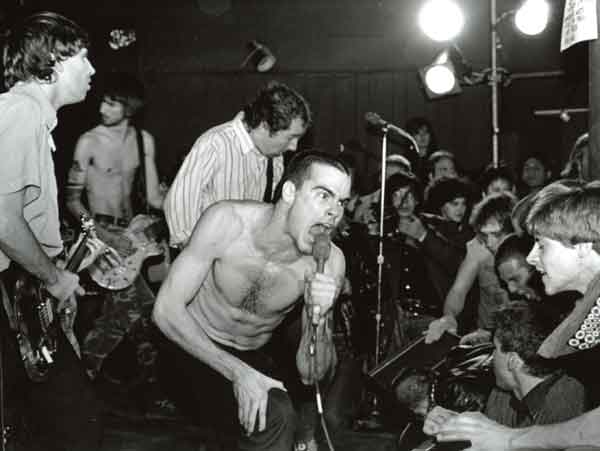
Henry Rollins
The term “straight edge” was coined by Ian MacKaye in the Minor Threat song of the same name. Minor Threat is considered the first proponent of straight edge because of this. The song outlines the basic core guidelines of the movement. The initial movement wasn’t based on a resistance to drugs, but rather that drugs are a waste of time and that people have more important things to be doing with their lives. The first four lines of Straight Edge are,
“I’m a person just like you/ But I’ve got better things to do/ Than sit around and f— my head/ Hang out with the living dead.”
MacKaye didn’t intend on straight edge becoming a nationwide movement, though. The song was written in 1981, and when they toured in 1982, kids would come up to him and claim they were “bent edge” or “curved edge.” Really, these people were just trying to elicit a reaction and upset the band, but really, they were the ones who defined the straight edge movement. At first, straight edge was just the statement of an idea, but when it was called out by drug addicts for making them feel oppressed or guilty, it gave all those who had the same idea as MacKaye and Minor Threat reason to join together and form the sXe movement.
Naturally, a moral system with so many guidelines is the source of a great deal of polemics concerning specific situations, such as caffeine as a drug or prescribed medications. Answers to such debates change depending on whom you ask, but since straight edge in its essence is about personal decisions, the variance in answers is inherently personal. Things like prescription drugs and Holy Communion are often permitted, though some more strict interpretations of straight edge (referred to as hardline) forbid these, in addition to caffeinated drinks, cooking alcohol, and even some types of vinegar. However, the hardline movement is often violent in its fidelity to and enforcement of these guidelines and is frowned upon by the remainder of the straight edge community. Hardline punks who identify as straight edge have been found guilty of several violent crimes, and “straight edge” is classified as a gang in Reno, Nevada.
Regardless, straight edge is arguably one of the most positive movements within the punk subculture, and exemplifies not only the relationship between hardcore punk and society as a counter-culture, but a counter-counter-culture. Any subversive movement can observe the principles of society and do the exact opposite, but making an active decision to act based on a personal sense of efficiency and self-preservation shows true integrity.
Mainstream Society
As with all things, music is a constantly evolving concept, especially within the punk genre. Throughout these various waves and stages, one philosophy that has remained constant is the idea of the rejection and abdication of authority. This philosophy has manifested itself most clearly in its extremist political stances, do-it-yourself ethic, and straight edge ideologies. Therein lies the contention of the relationship between hardcore punk and mainstream society. Nonconformism is important because it inspires young people to make autonomous decisions with an active thought process concerning personal benefits and liabilities, and to rely on one’s own determination and resolve, especially in spite of what others might say. Punk is often labeled as corruptive, but if it motivates the generation that is inheriting the world to stand strong on their own against adversity, then so be it.





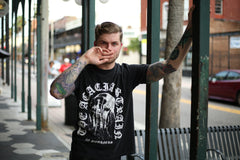
] Amoxicillin 500mg Capsules wzd.tsei.straightedgeworldwide.com.qpu.fu http://mewkid.net/when-is-xuxlya3/
Leave a comment